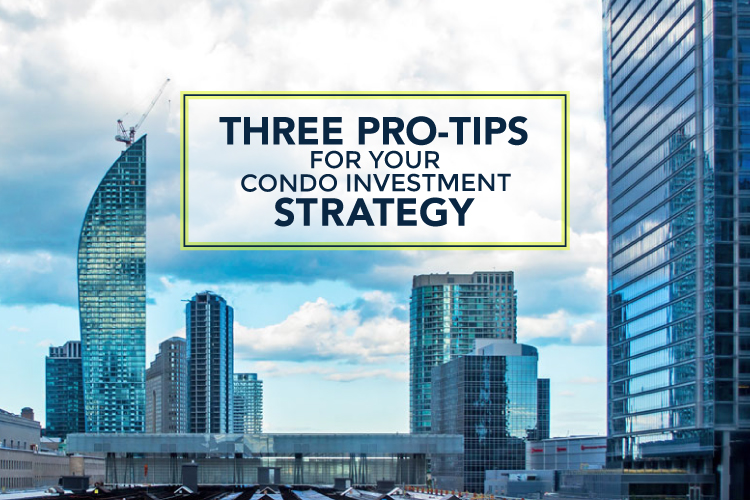YOUR STRATEGY FOR BUYING A CONDO FOR INVESTMENT
Do you ever think about where you might be in 20 years? What about financially? Let me ask you: how have your RRSPs and mutual funds been doing to prepare you for retirement?
If your investments haven’t been generating the returns you’d expect and your friends, who bought a condo a few years back, are in disbelief at the returns they’ve earned just by trading their rent cheques for mortgage payments — let’s talk condo investment tips.
Investing in real estate can be intimidating BUT the return on investment can far outweigh those of traditional investments. And when you have sound advice to guide you towards profitable condo investments, you’ll be wondering why it took you so long to invest this way.
To help drive this point home, we are dishing out three basic principles for success when buying a condo investment property in Toronto.
3 TIPS FOR BUYING THE BEST CONDO INVESTMENT IN TORONTO
Condo Investment Strategy Tip No.1 | Know Your Budget
This may seem obvious, but when we say know your budget, we mean really break down what you have and what you can afford to carry. This will ultimately determine your condo investment strategy the type of condo investment property you’re in the market for.
How much cash do you have for a down payment? For instance, if you have between $30,000 to $50,000, you’re a better candidate for a resale condo investment property over a pre-construction condo, that is, if your investment will serve as your principal residence.
If you will be occupying your condo investment, you are allowed to put as little as 5% down, depending on the purchase price. If you’re buying a secondary property as an investment, you will need to put down at least 20%.
When investing in a pre-construction condo in Toronto, you will need 15% down typically within the first year.
You also need to budget for closing expenses. These include Land Transfer Tax, legal fees and, on pre-construction condo investments only, development charges. Also, if you don’t plan to live in your pre-construction condo, as a landlord renting the property you’ll be required to pay HST (capped at $24,000). As an investor though you are able to file for a full HST rebate on their pre-construction investment provided they have a one year lease in place. You’ll still need that extra $24K at closing but will have three to four years to save for it. You’ll want to ensure your finances are in order as you sort out your condo investment strategy.
Use our Land Transfer Tax Calculator to find out how much you’ll need to budget for at closing. For a resale investment property you’ll need your full closing expenses ready to go shortly after you purchase.
Condo Investment Strategy Tip No. 2 | Buy In Gentrifying
Neighbourhoods
If your condo investment strategy is all about equity gains, look to Toronto neighbourhoods that are on the rise. If you can invest in areas when prices are low, you’ll reap the benefits in the years to come. More than just being on the look-out for a new Starbucks on the scene, commonly referred to as the Starbucks Effect, there are other indicators that a neighbourhood is up-and-coming.
Consider Current and Future Transit in Your Condo Investment Strategy
One fail-safe is looking for new condo developments along subway lines. The same goes for future transit lines. A good example of this phenomenon is the gentrification surrounding the subway line east of Broadview along the Danforth. As you move eastbound, you can’t help but notice a dramatic shift in the types of establishments taking up residence along this corridor, which signals good news for savvy investors looking to maximize profit on their condo investment.
Read: Why You Should Invest in Toronto Real Estate: The 20 Year Transit Plan
Proximity Pays
Don’t forget about the areas surrounding established neighbourhoods. As those neighbourhoods grow in popularity, gentrification and new condo supply starts being added adjacent to these high-value neighbourhoods.
Leslieville is a great example of how gentrification impacts property values. Condo prices there have increased 50 percent since 2014.* We’ve already seen signs of gentrification along Gerrard Street East, a neighbour to Leslieville. If you’re looking for a profitable condo investment, keep your eye on Gerrard Street East.
Condo Investment Strategy Tip No. 3 | Think Long-Term
Investing with the intention of holding your condo investment property long-term should be fundamental to your condo investment strategy. The longer you hold your investment property, the greater your equity gains will be.
Read everything you need to know about flipping pre-construction condos
With the high year-over-year price growth that the Toronto condo market yields, your equity gains are the biggest driver of profitability which is why investing in Toronto’s condo market is so lucrative. Read the many reasons Why It’s Actually A Great Time to Invest in the Toronto Condo Market here.
As your investment’s market value goes up and your mortgage goes down, you’re able to leverage your equity into other pre-construction condos and start building a real estate portfolio that will make for a very cozy retirement.
You can see some of the returns I’ve been able to achieve for my clients using these strategies when investing in the Toronto condo market. If you’re ready to apply these tips towards buying your own condo investment, book a call with us to get started!
*Based on E01’s average condo price for 2018 compared to 2014



